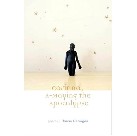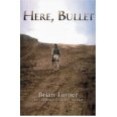 Though fiction writers are often the first to prostrate themselves and say they don’t get poetry, these books could not be “for fiction writers” in the way that Thomas Kincaid is for people who don’t go to art museums. Good poetry is good poetry, and if a book is recommended here, I love it, many other poets love it, and it should be an engaging and inspiring read for writers in any genre.
Though fiction writers are often the first to prostrate themselves and say they don’t get poetry, these books could not be “for fiction writers” in the way that Thomas Kincaid is for people who don’t go to art museums. Good poetry is good poetry, and if a book is recommended here, I love it, many other poets love it, and it should be an engaging and inspiring read for writers in any genre.
To qualify for the list, each book also had to meet these criteria:
- It had to tell a story or stories – either through narrative, images, or other means.
- It had to be a new release (or close to it), since FWR focuses mostly on the current fiction scene. There is one exception, but I figure that poems about the Iraq war are unfortunately, still “current.”
1. BLACKBIRD AND WOLF– Henri Cole
(Farrar, Straus and Giroux, 2008)
For fiction writers who like: Alice Munro

The cover art is just right: the tone of these poems is clear and deep as the center of a lake. Henri Cole is a poet who seems equally candid demanding, “Teach me to love” or announcing casually, “I went out for coffee and found a woman in a wheelbarrow.” <i>OK,</i> you say to yourself. <i>That sounds right.</i> Putting himself at the calm eye-of-the-Freudian-storm, Cole can say just about anything and it registers as purely felt. In this book, he gets away with all the things you would tell a beginning poet to avoid: giant emotive statements, self pity, shameless projection onto the plant and animal world, and a poem called “To the Forty-Third President.” Cole shows that, with much contemporary poetry enamored of a careful non-saying, saying can startle again.
from “Self-Portrait with Hornets”
Hornets, two hornets, buzz over my head;
I’m napping and cannot keep my eyes open.
“Do you come from far away” I ask, dozing off.
My gums are dry when I wake. A morning breeze
rakes the treetops. I can smell the earth.
The two hornets are puzzling over
something sticky on my night table,
wiping their gold heads with their arms.
Ordinary things are like symbols. My eyes are watery
and blurred. Then I lose myself again.
2. CORINNA A-MAYING THE APOCALYPSE – Darcie Dennigan
(Fordham University Press, 2008)
For fiction writers who like: Vladimir Nabokov

These poems will let you experience what it feels like to be on a front porch in West Warwick, Rhode Island (…or in an online chat room…or at “Flo’s Grille”) and simultaneously in some almost cosmic space of reckoning with nostalgia, safety, family, industry, and fate. Where most contemporary poems, perhaps in their quest to be timeless and transcendent, would never step into anything so pedestrian as a coffee chain, these poems see that the very real walls of—yes—a Starbucks or a train station or a bar in Boston actually make for some pretty transcendent stuff. But such love of place would be un-thrilling if not coupled with a voice so delightfully off-kilter and rollicking as the one that breathes life into these poems. With their classical references and rapturous etymology-driven vocabulary, the lines are loaded but never encumbered. Each reading sends something else up. Most entrancing are the long poems: “The Feeling of the World as a Bounded Whale is the Mystical,” “Sentimental Atom Smasher,” “Orienteering in the Land of New Pirates,” and “Seven Generations of Stephen Bruneros.”
from “City of Gods”
Thistly Augustine, disser of the shy world, I cannot consider your city.
I cluck my tongue at the sun & sky. The sky rises
too steeply. My soul goes no
higher than the highest highway billboard.Oh Pericoli on a boat, a Mongoose, a motorcycle—you can’t
draw the gods of New York from New Jersey.
Just across the cosseted alley they sit: the gods in the dark, eating fishsticks.
3. MICHELANGELO’S SEIZURE – Steve Gehrke
(University of Illinois Press, 2007)
For fiction writers who like: Joseph Conrad
 By writing of disturbed, obsessed, often death-bound artists from Goya to Pollock, Gehrke crafts lyrical biographies – not so much of characters as of their erosions. Gehrke does love his metaphors. Fortunately, whatever factory in his brain cranks them out, I’d buy from it wholesale. His sentences are (to borrow his preferred mode of expression) structured like Russian nesting dolls, one image inside another inside another, seemingly endlessly. Though his poems sometimes bring you to the brink of fatigue, they bring you there with a riveting confidence.
By writing of disturbed, obsessed, often death-bound artists from Goya to Pollock, Gehrke crafts lyrical biographies – not so much of characters as of their erosions. Gehrke does love his metaphors. Fortunately, whatever factory in his brain cranks them out, I’d buy from it wholesale. His sentences are (to borrow his preferred mode of expression) structured like Russian nesting dolls, one image inside another inside another, seemingly endlessly. Though his poems sometimes bring you to the brink of fatigue, they bring you there with a riveting confidence.
from “Magritte in New York”
Looking out upon the hushed
glass towers, the catwalks
and metal spires, the top
of the Empire State Building,
like the spike on a soldier’s hat,
the whole city, he thinks built
by an imagination more savage
than he’d guessed, Magritte sees his own
mother lit up beneath the candelabra
of the Brooklyn Bridge, lifting her nightgown
up above her knees to mount
the moon-slick railing, the night behind her,
clotted with the traffic
of the stars. He can see her slippered
footprints winding out behind her
like the punctured roll of music
a player piano eats into song,
so that he can almost hear
a music as she falls…
4. AT THE DRIVE-IN VOLCANO – Aimee Nezhukumatathil
(Tupelo Press, 2007)
For fiction writers who like: Lorrie Moore
 The poems of Aimee Nez (as she mercifully lets us abbreviate her name) start out with a simple premise, like a single dancer – “I found a bat today”… “A brunch of Bellinis and crab omelettes is how I love to wake up in NYC”… “We are the oldest people in line waiting to pet a baby sand shark” – which she then lets shimmy gently until, without your even realizing it, she has filled the dance floor. Because of all the exotic animals and foods in her poems, and perhaps inevitably because her first book was called Miracle Fruit, Aimee Nez’s poems usually get described as if they were something to bite into: sensual, flavorful, ripe, bittersweet, and so on. Fair enough. But, more frequently, the poems in At the Drive-In Volcano remind me of the taster than the tasted. We share in her appetites and meals: at turns curious, nervous, wistful, or adventurous – and always with plenty of intimate, generous conversing with table-mates between bites.
The poems of Aimee Nez (as she mercifully lets us abbreviate her name) start out with a simple premise, like a single dancer – “I found a bat today”… “A brunch of Bellinis and crab omelettes is how I love to wake up in NYC”… “We are the oldest people in line waiting to pet a baby sand shark” – which she then lets shimmy gently until, without your even realizing it, she has filled the dance floor. Because of all the exotic animals and foods in her poems, and perhaps inevitably because her first book was called Miracle Fruit, Aimee Nez’s poems usually get described as if they were something to bite into: sensual, flavorful, ripe, bittersweet, and so on. Fair enough. But, more frequently, the poems in At the Drive-In Volcano remind me of the taster than the tasted. We share in her appetites and meals: at turns curious, nervous, wistful, or adventurous – and always with plenty of intimate, generous conversing with table-mates between bites.
from “At Medusa’s Hair Salon”
“All the pretty men ask if I have a perm.
No, I say, my little grandmother also hasdark corkscrew curls and though
my father is bald now, it passed to me.From my swivel chair I can hear the thruway
rolling trucks loaded with horses, cars,or gravel headed west. Sometimes I can even
see their lights from my bedroom windowand I am sad that even at four in the morning,
when they should be asleep—I shouldbe asleep—I hear them push at the wheel,
following the white lines five hoursto you in Ohio. And when I’m reminded
of how you ended it, I say to Henri, Cut it,cut it all.”
5. HERE, BULLET – Brian Turner
(Alice James Books, 2005)
For fiction writers who like: Tim O’Brien
 You forgive this book all its faults. And it does have some. Not deftly organized to take full advantage of the emotional momentum it so frequently generates and yet not reckless and raw enough to abandon the need for it, it can occasionally frustrate. And yet, not only because it is probably the only book of poems you could name with an author who saw combat in Iraq, and not out of any sort of obligatory appreciation for the service it chronicles, this book settles on your brain like a sandstorm. (The metaphor’s no coincidence: the poems are full of sand.) The poetry does not bother with big ideas of heroism or purpose, but neither is it neutral or journalistic. The poems are deeply melancholy. They return to their images in a way that suggests the poet does not have the luxury of choosing other ones. Most often, the poems hovers with great apprehension over the human form: whether it is haunting clothes hung out on a line by an Iraqi woman, wandering ghostlike through history or daily life, being scattered into parts by a sudden sickening blast, or tauntingly narrating its own invitation to destruction in the title poem. The dream poems are some of the finest, attesting to the fact that the mind, while it offers the only hope of escape or transcendence, is frequently the most stubborn shackle to trauma.
You forgive this book all its faults. And it does have some. Not deftly organized to take full advantage of the emotional momentum it so frequently generates and yet not reckless and raw enough to abandon the need for it, it can occasionally frustrate. And yet, not only because it is probably the only book of poems you could name with an author who saw combat in Iraq, and not out of any sort of obligatory appreciation for the service it chronicles, this book settles on your brain like a sandstorm. (The metaphor’s no coincidence: the poems are full of sand.) The poetry does not bother with big ideas of heroism or purpose, but neither is it neutral or journalistic. The poems are deeply melancholy. They return to their images in a way that suggests the poet does not have the luxury of choosing other ones. Most often, the poems hovers with great apprehension over the human form: whether it is haunting clothes hung out on a line by an Iraqi woman, wandering ghostlike through history or daily life, being scattered into parts by a sudden sickening blast, or tauntingly narrating its own invitation to destruction in the title poem. The dream poems are some of the finest, attesting to the fact that the mind, while it offers the only hope of escape or transcendence, is frequently the most stubborn shackle to trauma.
from “The Al Harishma Weapons Market”
“At midnight, steel shutters
slide down tight. Feral cats slink
in the periphery of the streetlamp’s
dim cone of light. Inside, like a musician
swaddling a silver-plated trumpet,
Akbar wraps an AK-47 in cloth.
Grease guns, pistols, RPGS—
he slides them all under the countertop.”





